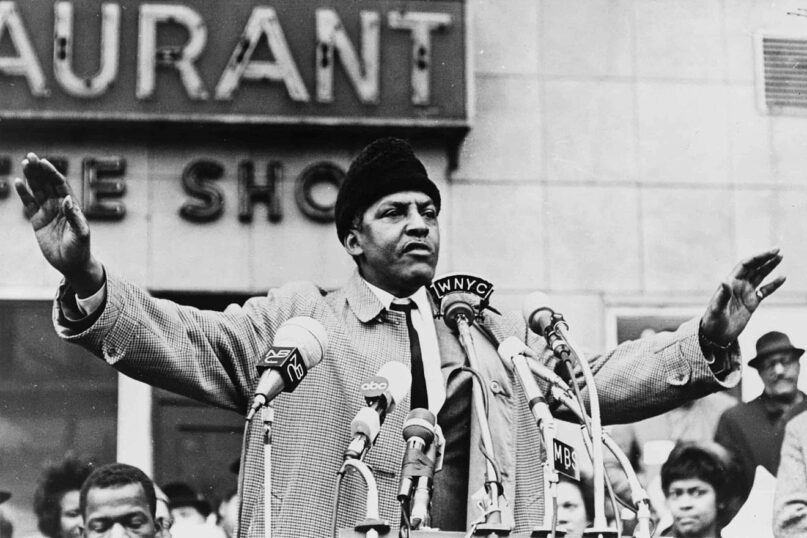
By Iris Tratt
In the aftermath of Hamas’s barbaric Oct. 7 terrorist attack on Israel and the Jewish people, Jewish Americans were dismayed by the response from those they considered allies. Years spent suppressing any mention of Israel turned to despair as progressive organizations, including the Black Lives Matter movement, justified and even celebrated the Hamas massacre.
Thankfully, media exposure has recently been given to two black Americans whose work provides an opportunity for reviving relations between the Jewish and black communities.
Last month, Netflix began streaming the movie “Rustin,” which depicts the life of pivotal civil rights activist Bayard Rustin. Rustin, who died in 1987 and was openly gay, felt deeply connected to Jewish Americans and never shied away from supporting Israel, even when threatened by the rising popularity of Black separatists.
Earlier this year, famed economist and intellectual Thomas Sowell, who has spent decades rejecting the toxicity of progressive policies, released his new book Social Justice Fallacies. Born into poverty in 1930s North Carolina, Sowell revealed the deceptions embedded in the social justice crusade, a phenomenon that has captured the attention and directed the politics of America’s “enlightened” elite class.
“Rustin,” produced by Barack and Michelle Obama’s production company, does not mention Rustin’s advocacy on behalf of Israel in any detail, even though he and A. Phillip Randolph founded the Black Americans to Support Israel Committee (BASIC) in 1975. The establishment of BASIC was a response to black nationalists’ alignment with Yasser Arafat and his terrorist PLO, which was gaining legitimacy in international circles.
In 1975, Rustin spearheaded the placement of a full-page ad in The New York Times, signed by some 200 black supporters, that defended Israel against its growing chorus of detractors. That 45 years later, over 600 Jewish groups would sign on to a Times ad endorsing the Black Lives Matter movement, whose original platform openly maligned Israel, highlights how much things have changed.
Rustin’s defense of Israel, which he visited in 1969 and 1982, gained renewed urgency in 1979 after the black U.S. Ambassador to the U.N. Andrew Young resigned from his post following his meeting with a PLO representative. Rustin, responding to claims that American Jews had accelerated Young’s departure, publicly denounced black leaders in a powerful Times article for “striking back against Israel and the American Jewish community for their supposed involvement in engineering Mr. Young’s ouster.”
Years before BLM’s Chicago chapter publicized an image of a paraglider to express its support for terrorism, Rustin’s efforts portended the struggle that would emerge in full decades later.
Sowell’s solidarity with Israel builds on Rustin’s legacy. In Social Justice Fallacies, Sowell notes that danger lies not with citizens possessing different beliefs. Instead, he argues, what is dangerous “is the extent to which such beliefs prevail without being subjected to tests of either facts or logic.”
The fervency with which many progressives have embraced an antisemitic ideology steeped in genocidal delusions proves Sowell’s thesis. The timing of Social Justice Fallacies, released weeks before thousands of terrorist sympathizers took to the streets in Western capitals, makes his claim even more compelling.
Throughout history, people in critical positions have taken courageous stands that shaped the trajectory of American society. Famed conservative intellectual William F. Buckley Jr. used his perch as the founder of National Review to divorce conservatives from the antisemitism fostered by right-wingers like Buckley’s colleague Joseph Sobran and Republican politician Pat Buchanan. Buckley’s groundbreaking book In Search of Antisemitism denounced and marginalized the Jew-haters in the Republican camp.
The late Democratic Senator and Ambassador to the U.N. Daniel Patrick Moynihan’s powerful 1975 address to the General Assembly condemning the body’s “Zionism is Racism” resolution was a high point in America’s longstanding policy of safeguarding Israel at the U.N. This policy held until former President Barack Obama broke with Moynihan’s legacy in 2016. In a parting shot at Israel, the outgoing president helped pass anti-Israel Security Council Resolution 2334. That Moynihan’s death in 2003 arrived as Democrats increasingly distanced themselves from Israel suggests that his moral clarity has been abandoned by today’s progressive activists.
America’s children should be encouraged to read Sowell and learn from Rustin’s life. For their part, Jewish liberals must stop supporting groups hostile to them and Israel. Instead, they should empower leaders like Dumisani Washington, founder and CEO of the Institute for Black Solidarity with Israel, who has been aptly described as the Martin Luther King, Jr. of our time.
We should celebrate those whose contributions elevate, rather than destroy, America’s social fabric. Leaders like Rustin and thinkers like Sowell can inspire a renewed and robust relationship between Jewish and black Americans.
Irit Tratt is a pro-Israel advocate residing in New York.
PHOTO: Bayard Rusin
CAP: Civil rights leader Bayard Rustin in 1965. Source: Library of Congress







 Southern New England Jewish Ledger
Southern New England Jewish Ledger














